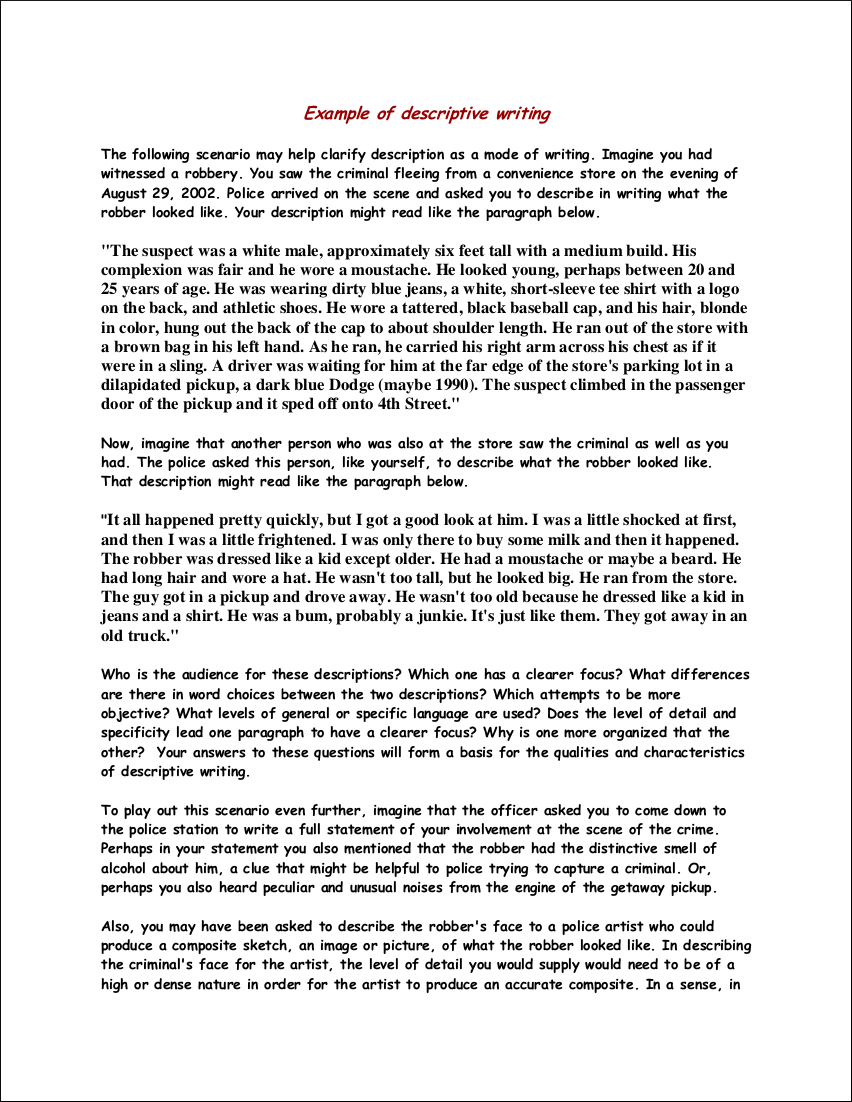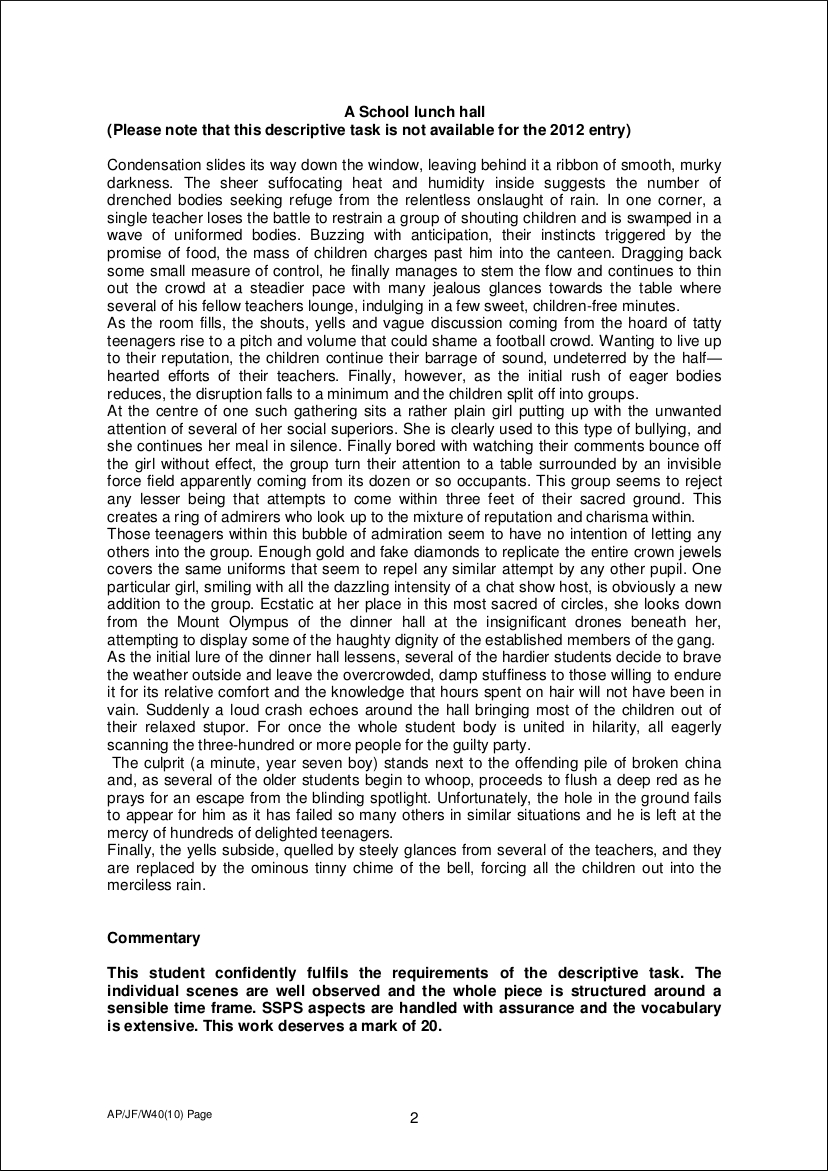
Mar 20, · Characteristics of descriptive writing 1. Good descriptive writing includes many vivid sensory details that paint a picture and appeals to all of the reader's senses of sight, hearing, touch, smell and taste when appropriate. Descriptive writing may also paint pictures of the feelings the person, place or thing invokes in the writer Descriptive essays are the best option when it comes to describing and writing about a person. A descriptive essay is written using the five human senses. It helps in creating a vivid image in the reader’s mind and understanding what the writer is trying to convey. Here is one of the best descriptive essay examples about a person Descriptive writing is a description of something. It could be a person, place, thing, emotion or experience. The author is allowed more artistic freedom when writing in descriptive form. While both descriptive and narrative essays are similar in many ways, the descriptive essays use of language fully immerses the reader into the
Good Descriptive Essay Examples for All Students
Descriptive writing has a unique power and appeal, as it descriptive writing about sights, smells, sounds, textures, and tastes, descriptive writing about. Using description in your writing brings the world within your text to your reader.
The first step in using effective description is to focus on a dominant impression. A dominant impression creates a mood or atmosphere in your paper. This mood can be conveyed through effective descriptive writing. For example, pay attention to the mood in the following paragraph. My family ate dinner at Merrymead Diner every Friday night while I was a child. We huddled close in a large, red booth as we scanned the familiar menu. The aroma of gravy over creamy mashed potatoes lingered in the air.
The waitress brought our thick milkshakes out on a tray and placed them in front of us on a paper doily. The jukebox in the back played songs that we all knew the words to, and we sang along until our food arrived, hot and enticing on the table. Outside I shivered in the cold air, but in the diner I was cozy, munching on crispy French fries and enjoying a hot, juicy cheeseburger, descriptive writing about. Can you feel the mood of this paragraph?
The author is trying to convey a feeling of safetycomfortand happiness, descriptive writing about. Notice how the author does not tell the reader she feels safe and happy. She shows the reader through descriptive detail, descriptive writing about.
Her dominant impression is one of comfort and happiness. Sensory description uses sight, sound, smell, touch, and taste to sketch an impression in writing. Consider a paragraph without sensory description. My sister and I walked along the boardwalk each afternoon of our vacation, descriptive writing about.
We watched the ocean and listened to the waves. Usually we stopped for a snack at one of the descriptive writing about stores that line the boardwalk. Afterwards, we walked along the beach and let our feet get wet. Now, consider this paragraph with all five sensory descriptors: sight, sound, smell, taste, and touch. My sister and I walked along the boardwalk one afternoon on our vacation, descriptive writing about.
The hot boards warmed our bare feet. We watched the foam-covered waves topple over each other and then slide back into sea. The crashing water competed with the exuberant yells from descriptive writing about seagulls. We bought a perfectly oval fluff of pink cotton candy that dissolved sweetly in our mouths.
Afterwards, we walked along the edge of the water, letting the warm salty air blow our hair away from our necks as the cool water lapped over our toes. The sensory details you select in your writing should create for your reader the same picture you have in your mind. Instead of using vague, general words, your sensory language should be concrete and sensory-packed.
This makes the difference between vivid and vague descriptive writing about. Take a look at the comparison between vague and vivid sentences. When using descriptive language, it is important to vary your sentence structure. Try to avoid using the same subject-verb pattern in all sentences. Embedding descriptive elements and combining sentences can help to avoid descriptive writing about routine subject-verb structure.
Varying this sentence structure by embedding descriptive detail breaks the monotonous tone and the clipped, subject-verb style. Racing down an empty hall, she skidded into the classroom, breathless, descriptive writing about, just as the bell clanged above her.
Too many adjectives—retain only the most powerful words in your writing, deleting any unnecessary words. Too many adverbs—verbs are stronger than adverbs. She strolled into the room is more powerful than She walked casually into the room. Clichéd figures of speech—overused language, such as green with envysignals a lack of imagination.
Use fresh, descriptive words that go against rote thinking. The Kathleen Jones White Writing Center provides tutoring services, workshops, and writing resources. Toggle navigation Indiana University of Pennsylvania, descriptive writing about.
A—Z Index Find People. Toggle navigation Kathleen Jones White Writing Center. Writing Resources. Organization and Structure. Creating an Outline. Determining a Thesis. Writing Strong Introductions. Writing Strong Conclusions. Using Transitions. Dealing with Organizational Problems. How the Writing Center Can Help You Organize, descriptive writing about. More Information on Structure and Organization. Descriptive Writing. Supporting Your Ideas. Attend IUP Help Students Now.
Descriptive Writing Descriptive writing has a unique power and appeal, as it evokes sights, smells, sounds, textures, and tastes. Creating A Dominant Impression The first step in using effective description is to focus on a dominant impression. Sensory Details Sensory description uses sight, sound, smell, touch, and taste to sketch an impression in writing. Vivid vs. Vague Language The sensory details you select in your writing should create for your reader the same picture you have in your mind.
Vague Vivid The food was unappetizing. The pale turkey slices floated limply in a pool of murky fat. The sprinkler was refreshing. The cool water from the sprinkler sprayed our hot faces. The traffic was heavy. Descriptive writing about old car puffed as Main Street became clogged with a line of clamoring motorists. Vary Sentence Structure When using descriptive language, it is important to vary your sentence structure.
The hall was empty. She ran towards the classroom, descriptive writing about. She entered right after the bell rang. What to Avoid When Using Sensory Detail Too many adjectives—retain only the most powerful words in your writing, deleting any unnecessary words Too many adverbs—verbs are stronger than adverbs.
by Ali Faucher. More Writing Help The Kathleen Jones White Writing Center provides tutoring services, workshops, and writing resources. Tutoring In-Person : Temporarily suspended Online Tutoring: Use the online writing center. Workshops Instructors: Request a workshop for your class. Students: Attend a Wednesday-night workshop. Online Workshops: APA DocumentationMLA Documentation. Resources Online help with Grammar Organization Research documentation descriptive writing about more.
Kathleen Jones White Writing Center Eicher Hall, Room Grant Street IndianaPA Phone: w-center iup. Eicher Hall w-center iup.
Writing a Descriptive Paragraph - Examples
, time: 21:12Descriptive Essay About Myself - Words | Bartleby

Descriptive Writing & Figures of Speech The most important figures of speech are similes and metaphors. In fact, they lie at the very heart of great description. Used well, they can transform a story A descriptive essay about a place, broken down into geography, climate, politics, religion and culture; Exploring a historical event chronologically, beginning with a paragraph on what caused it, proceeding to a description of the event itself, and concluding with its consequences The descriptive essay is a genre of essay that asks the student to describe something—object, person, place, experience, emotion, situation, etc. This genre encourages the student’s ability to create a written account of a particular experience
No comments:
Post a Comment